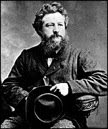 |
| Manuscript of Morris's "Why I am a Communist," one of IISH's holdings. |
Part I: The Venue, The International Institute of Social History
A more perfect venue could not be had. The International Institute
of Social History was founded in 1935 by Nicolaas W. Posthumus, a leading light
of Dutch social and economic history. A social democratic insurance company De
Centrale supported the Institute in its early years, allowing for it to save
archival materials related to left-wing movements from all over Europe.
Before World War II, the Institute played a key role in saving
papers by and about Karl Marx and Friedrich Engels from the Nazis. As the Institute's
website explains, "In the period 1935-40, attention was focused on saving
material from all over Europe. The most important collection acquired in this
period was the archival legacy of Marx and Engels. The Institute's extremely
active first librarian, Annie Adama van Scheltema-Kleefstra, actually smuggled
Bakunin's manuscript (part of the famous Nettlau collection) out of Austria, just
before the Nazis marched into Vienna. Libraries of Mensheviks and
Social-Revolutionaries who had fled Russia were also brought to
Amsterdam."*
Forced to close the Institute during the Nazi occupation of
Amsterdam, Posthumus had already smuggled the most valuable papers to Britain. The
Nazis removed most of the archives to Germany during the war, and it took the
Institute nearly a decade after the war to return to a state of normalcy. Since
1989, it has been housed in a former cocoa warehouse in Amsterdam's Eastern
Docklands area.
Although the IISH is most well known for its Marx and Engels
collection, it has significant holdings related to William Morris's socialist
activities. Among the items related to Morris are the papers of the Socialist
League, the Hammersmith Socialist Society, and the manuscripts of "How We
Shall Live Then," "As to Bribing Excellence," "and Why I Am
A Communist."**
Jason D. Martinek
Assistant Professor of History
New Jersey City University
Jersey City, New Jersey
*"History of the IISH," International Institute of
Social History, http://socialhistory.org/en/about/history-iish.
**"William Morris," International Institute of
Social History, http://www.iisg.nl/archives/morris/.
